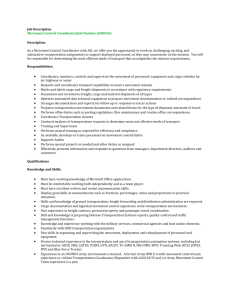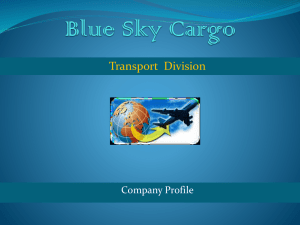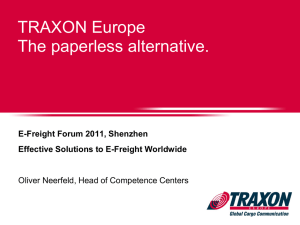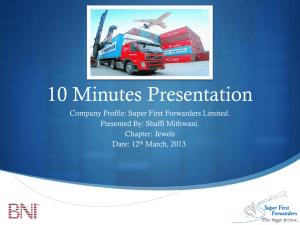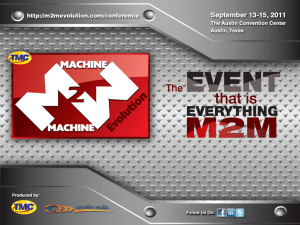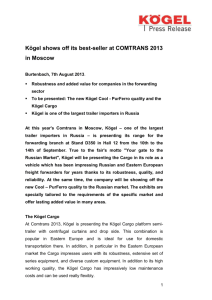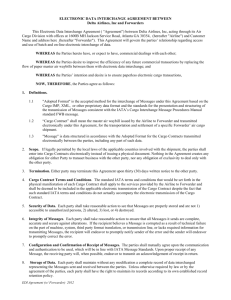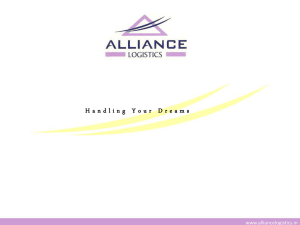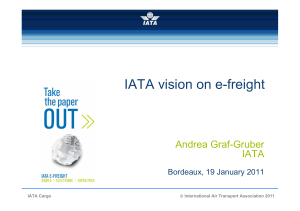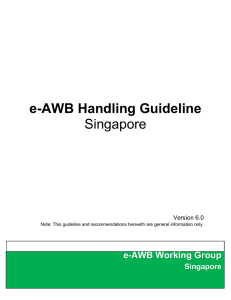IATA's Initiatives - Congreso Internacional FITAC
advertisement
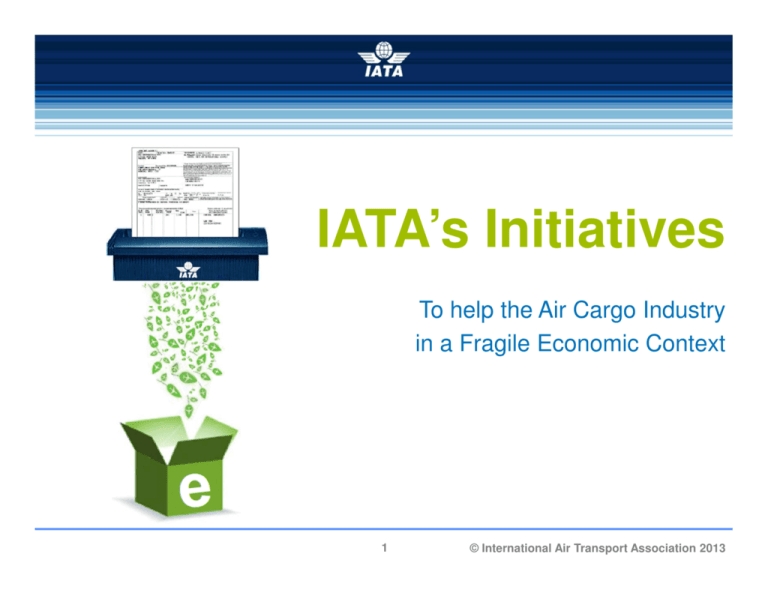
IATA’s Initiatives To help the Air Cargo Industry in a Fragile Economic Context 1 © International Air Transport Association 2013 Economic Outlook 2 © International Air Transport Association 2013 Economic Outlook In Latin America: Air Freight growth is over 3% in Latin America even if it suffered an important drop compared to the previous month 3 © International Air Transport Association 2013 Economic Outlook Comparison Settled Amounts 2013 Vs. 2012 The Americas (excl. USA): 2013 trend is similar to 2012 in the Region Source CASS 4 © International Air Transport Association 2013 Economic Outlook In the World: The evolution of the Air Shipments has been moderately positive during the last 2 years 5 © International Air Transport Association 2013 Economic Outlook Uptick in export orders at the start of Q3 Positive signal for both Trade Growth and Air Freight demand in months to come. Globally, IATA expects a moderate growth 6 © International Air Transport Association 2013 IATA’s Objectives 7 © International Air Transport Association 2013 IATA’s Objective Make the Air Freight More Competitive Cost Reductions Modernize the Processes Promote the Airfreight 8 © International Air Transport Association 2013 Costs Reduction 9 © International Air Transport Association 2013 Costs Reduction Advocacy: We challenge unreasonable rules and charges Help to lower your charges and to do business smoothly Training, key to success: Our ITDI training Center delivers up-to-date Cargo Trainings and Diplomas, some of them in co-operation with the Harvard University Improve your Cost Control, your Strategic Decisions and Processes 10 © International Air Transport Association 2013 Costs Reduction Secure Freight: From costly Security Controls to a Trustable and Recognized Secured Supply Chain Our aim: Help Countries to develop a National Security Plan meeting the OACI’s requirements Involve Airport Authorities, Airlines, Ground Handlers, Cargo Agents, Shippers, Civil Aviation, the Police, the Customs Authorities Obtain the Recognition of Secure Freight by existing National Security Programs in the World Expected Benefits: Reduce Time Loss and Security Costs while establishing irreproachable Security processes. 11 © International Air Transport Association 2013 Costs Reduction ACC3: For Security purposes, as from July 1st 2014, the European Union says that: “Air Cargo or Mail Carrier operating into the Union from a Third Country Airport” have to be ACC3 validated by an Independent Validator. Others Actors than Carriers wishing to Secure the Freight can apply for an Audit of their Operations by an Independent Validator. IATA developed the CEIV, first Independent Validators Training Center to be Approved by the European Union. The list of the Independent Validators is available here. 12 © International Air Transport Association 2013 Modernize the Air Cargo Industry 13 © International Air Transport Association 2013 Modernize the Air Cargo Industry Our life in 2013… 14 © International Air Transport Association 2013 Modernize the Air Cargo Industry Some other interesting Examples… Would your children be able to identify this Air Ticket? 15 © International Air Transport Association 2013 Modernize the Air Cargo Industry IATA works with and for you! E-Freight E-Air Waybill 16 © International Air Transport Association 2013 Modernize the Air Cargo Industry e-freight vision “Building and implementing an end-to-end paperless transportation process for the air cargo industry where paper documents are replaced with the exchange of electronic data” 17 © International Air Transport Association 2013 Modernize the Air Cargo Industry Shipper Carrier Origin Freight Forwarder Export Customs 1. 2. 3. 4. 5. 6. Invoice Packing List Certificate of Origin Letter of Instruction Dangerous Goods Dec. CITES Certificate* 7. 8. 9. 10. 11. 12. Ground Handler Ground Handler Air Waybill House Waybill House Manifest Export Goods Declaration Customs Release Export Security Declaration* 13. 14. 15. 16. 17. 18. Import Customs Flight Manifest* Freight Booked List* Export Cargo Declaration Import Cargo Declaration Transfer Manifest Transit Declaration* Destination Freight Forwarder Consignee e-freight scope 19. Import Goods Declaration 20. Customs Release Import 18 © International Air Transport Association 2013 Modernize the Air Cargo Industry E-AWB 1st step towards the e-Freight An Industry initiative: Standards developed with and endorsed by Airlines (IATA), Cargo Agents (FIATA), Customs Authorities (WCO) Working sessions organized by IATA take place in several countries to implement the e-AWB with key players from the Supply Chain, in direct contact with the local Authorities. The adoption of the e-AWB brings benefits to Everybody… 19 © International Air Transport Association 2013 Benefits of e-AWB Airlines (Case study with an airline) Increase productivity Eliminate operational tasks Eliminate double keyboarding and reduce number of manual errors Eliminate risk of losing documents Process shipments faster Reduce costs Reduce storage costs by eliminating paper documents and free up office space Respond faster to regulator bodies Reduce cycle time Perform pre-clearance to the customs Submit data with better quality to customs Contribute to the advanced reporting requirements 20 Increase quality of information Reuse customer data in an automated way Improve data accuracy, integrity, validity, consistency, criticality and information completeness Improve customer service Provide an improved & efficient service to the freight forwarder by simplifying their paper handling work and reducing their downtimes Pro-actively alert freight forwarder on document issues to let them adjust quickly and ensure loading of cargo as scheduled © International Air Transport Association 2013 Benefits of e-AWB Freight Forwarders (Case study with a freight forwarder) Increase productivity Reduce costs Eliminate operational tasks and risk of losing documents Save time by not waiting and queuing anymore at acceptance carrier’s counters Save time in correcting mistakes Streamline process: remove paper process on top of current electronic data exchange Reduce storage costs by eliminating paper documents and free up valuable office space Eliminate costs of paper destruction and recycling in efreight environment Eliminate need to purchase neutral AWB Reduce printing costs 21 Improve customer service Eliminate the management of discrepancies due to missing documents Handle urgent shipments with ease Provide immediate answer to customer via digital data access Facilitate customs clearance and speed up goods delivery Increase quality of information Improve data accuracy, integrity, validity, consistency, criticality and information completeness Use of electronic data instead of paper that can be lost © International Air Transport Association 2013 Benefits of e-AWB Customs Increase productivity Capability to automate processing Capability to access data prior to the arrival of physical shipment, contributing to the advanced reporting requirements Reduce need to key in data Increase quality of information Reuse custom data in an automated way Improve data accuracy, integrity, validity, consistency, criticality and information completeness Enable data sharing with other government agencies Reduce costs Reduce storage costs by eliminating paper documents and free up office space Reduce manpower costs related to handling paper and keying of information Increase level of security Capability to detect automatically inconsistency between documents Capability to automatically capture security related data 22 © International Air Transport Association 2013 Some of the Carriers implementing the e-AWB 23 © International Air Transport Association 2013 Your next steps to stay competitive: Be legally prepared to issue e-AWBs Sign the Multilateral Agreement Ensure IT readiness Contact IT Providers Contact some Airlines to make a Pilot Activate the Multilateral Ensure Correct Data Quality Decide when you stop issuing paper AWBs…and start taking benefits of a new way of doing business! 24 © International Air Transport Association 2013 The Multilateral e-AWB agreement Free of Charge Signed once with IATA Legally allows you to issue e-AWB Conditions of Carriage MULTILATERAL AGREEMENT Unchanged Endorsed by FITAC and most of the Freight Forwarders’ Associations., including FIATA Does not oblige you to issue Multilateral agreement (Resolution 672) all your AWBs electronically 25 © International Air Transport Association 2013 IT Solutions Freight Forwarders with e-AWB capable in-house IT system: Connect the system to the Airline’s one to send and receive FWB messages (format Cargo-IMP or new Cargo-XML to the Airlines) Freight Forwarders without e-AWB capable in-house IT system: Use Web Portals developed by the Airlines, CCS, local FF Association… Or, alternatively, Contact the IATA strategic Partners or any other providers, who propose ready-to-deploy solutions 26 © International Air Transport Association 2013 IATA Strategic Partners IATA Strategic Partners are IT Service Providers that are working with IATA on cargo initiatives Directory of IATA Strategic Partners: http://www.iata.org/about/sp/Pages/partners.aspx 27 © International Air Transport Association 2013 Promote the Air Cargo Industry 28 © International Air Transport Association 2013 Promote the Air Cargo Industry Campaign “Air Cargo Makes It Happen” IATA created as set of different Posters and Postcards to promote the Air Cargo Industry Do not hesitate to contact us should you like to publish some of advertisements in your internal brochures, in your webpage, or during exhibitions These documents’ files are provided to you free of charge to develop the Industry. 29 © International Air Transport Association 2013 “It is not the strongest species that survive, nor the most intelligent, but the ones most responsive to change.” Charles Robert Darwin Thank you Olivier Sécache Regional Cargo Manager, The Americas Secacheo@iata.org www.iata.org 30 © International Air Transport Association 2013
